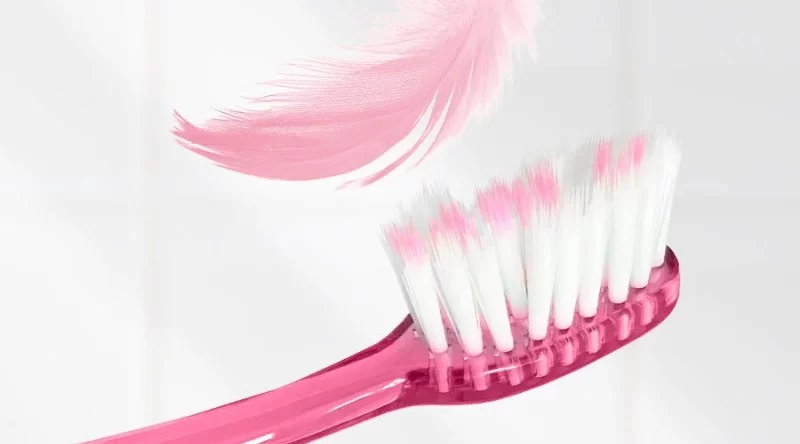
- understanding-why-sensitive-enamel-and-gums-need-special-care
- 1-key-features-of-the-best-toothbrush-for-sensitive-enamel-and-gums
- 2-electric-vs-manual-toothbrush-which-is-gentler
- 3-real-user-stories-soft-doesnt-mean-ineffective
- 4-professional-dentist-perspective-on-gentle-dental-care
- 5-choosing-your-next-toothbrush-the-smart-way
Understanding Why Sensitive Enamel and Gums Need Special Care
Enamel erosion and gum sensitivity aren’t just inconveniences—they’re signs your mouth is under stress. If brushing feels painful, or if cold drinks give you a sharp jolt, it’s time to rethink your dental tools. Choosing the best toothbrush for sensitive enamel and gums can drastically reduce discomfort while protecting your oral health over time.
1. Key Features of the Best Toothbrush for Sensitive Enamel and Gums
1.1 Ultra-Soft Bristles: A Must, Not a Maybe
Forget “medium” or “firm.” For those with sensitive enamel or inflamed gums, ultra-soft bristles are essential. They clean effectively without scraping away precious enamel or irritating tissue. Look for rounded bristle tips and densely packed brush heads for a gentle yet thorough experience.
1.2 Ergonomic Handle and Pressure Control
People often don’t realize they brush too hard. A well-designed handle or pressure sensor helps you keep a light touch, which is key when enamel is thin or gums are receding. Some modern electric brushes even vibrate or stop if you're pressing too firmly.
1.3 Bristle Shape and Head Size
The best toothbrushes for sensitive enamel and gums typically feature compact heads that reach difficult spots without aggravating sensitive areas. Curved bristles also help navigate the gumline gently and efficiently.
2. Electric vs. Manual Toothbrush: Which Is Gentler?
2.1 Not All Electric Brushes Are Equal
Some assume electric toothbrushes are too aggressive—but that depends on the model. High-quality brushes with soft heads and smart features can be even gentler than manual ones. Brands like Oral-B and Philips Sonicare offer models specifically for sensitive teeth and gums, often with pressure sensors and customizable settings.
2.2 Manual Brushes Still Have a Place
For those who prefer full control, a good manual brush with soft bristles and an ergonomic grip can be just as effective. Many dental hygienists recommend alternating between electric and manual for different times of day or travel needs.
2.3 User Choice Depends on Habit and Technique
Ultimately, the best toothbrush for sensitive enamel and gums is one you’ll use properly and consistently. Whichever type you choose, brushing gently for two minutes, twice daily, is more important than the tool alone.
3. Real User Stories: Soft Doesn’t Mean Ineffective
3.1 Jennifer’s Switch to a Sensitive Brush
“After years of gum bleeding and soreness, I finally tried a sensitive head toothbrush,” says Jennifer, a nurse from Chicago. “I thought I needed something ‘firm’ to clean well—but once I switched, my gums actually stopped bleeding within a week.”
3.2 David’s Experience with Enamel Erosion
“I used whitening toothpaste and a hard-bristled brush for years. Then my dentist showed me how much enamel I had lost,” says David, a coffee enthusiast and cyclist. “Now I use an ultra-soft sonic brush. It still feels clean but never hurts.”
3.3 Social Trends Around Oral Care
On platforms like Reddit and TikTok, hashtags like #SoftBristleOnly are gaining traction as users share their transitions to gentle brushing routines. More and more people are realizing that strength doesn’t mean better when it comes to oral care.
4. Professional Dentist Perspective on Gentle Dental Care
4.1 Why Overbrushing Is a Modern Problem
According to Dr. Amanda Liu, DDS, many patients unknowingly damage their teeth by using overly stiff brushes and aggressive strokes. “We see enamel wear and gum recession often, especially in people who are actually trying to be too clean,” she explains.
4.2 The Importance of Pairing Tools with Technique
Dr. Liu emphasizes that the right toothbrush must be paired with proper brushing technique. “Even the softest bristles can cause damage if used incorrectly,” she says. That’s why many dentists recommend tools that offer feedback, such as pressure sensors or timer functions.
4.3 Dentist-Recommended Brands
While dentists may vary in preference, many support trusted brands like Curaprox, Radius, and Sensodyne for manual brushes, and Sonicare or Oral-B for powered models tailored to sensitivity concerns. For a curated list of trusted tools, you can always check what’s trending on Dentistry Toothtruth.
5. Choosing Your Next Toothbrush the Smart Way
5.1 Match Your Needs, Not the Marketing
Don’t fall for toothbrushes marketed as “intense” or “whitening” if you have sensitivity issues. Those often use abrasive bristles or paste that worsens enamel loss. Instead, focus on keywords like “soft,” “gentle,” or “sensitive care.”
5.2 Test and Adjust
It may take trying a couple of models to find the best toothbrush for your sensitive enamel and gums. That’s perfectly normal. Many retailers offer satisfaction guarantees or subscriptions that let you test brushes risk-free.
5.3 Get Personalized Recommendations
Still unsure? Visit Dentistry Toothtruth to explore top-rated brushes tailored for sensitivity, along with customer reviews and dentist-backed tips. Whether you're managing gum tenderness or recovering from enamel erosion, there's a better, softer way to brush—and it starts with the right toothbrush.







 CJ Dental4.0 (13 review)
CJ Dental4.0 (13 review) Gentle Family Dentistry5.0 (60 review)
Gentle Family Dentistry5.0 (60 review) Duncan Dental5.0 (344 review)
Duncan Dental5.0 (344 review) Aspen Dental - Philadelphia, PA4.0 (326 review)
Aspen Dental - Philadelphia, PA4.0 (326 review) Hanover Dental4.0 (337 review)
Hanover Dental4.0 (337 review) Lakewood Dental Care4.0 (12 review)
Lakewood Dental Care4.0 (12 review) The Importance of Oral Health Education During Pregnancy for a Healthy Pregnancy
The Importance of Oral Health Education During Pregnancy for a Healthy Pregnancy Best Tips for Brushing Your Teeth Properly for Healthy Gums: Essential Techniques for Oral Health
Best Tips for Brushing Your Teeth Properly for Healthy Gums: Essential Techniques for Oral Health Why Skipping Dental Checkups Can Lead to Bigger Oral Health Problems
Why Skipping Dental Checkups Can Lead to Bigger Oral Health Problems Advantages of Porcelain Dental Restorations
Advantages of Porcelain Dental Restorations How Can Diabetes Cause Tooth and Gum Problems? Preventing and Managing Oral Health Issues
How Can Diabetes Cause Tooth and Gum Problems? Preventing and Managing Oral Health Issues Healthy Habits for Promoting Good Oral Health and Hygiene: Tips for a Healthy Smile
Healthy Habits for Promoting Good Oral Health and Hygiene: Tips for a Healthy Smile